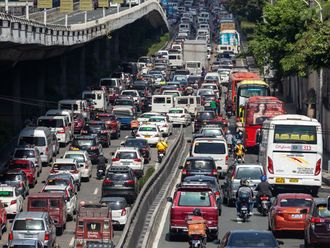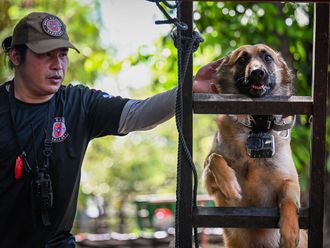Manila: President Benigno Aquino cancelled three-day peace talks between the Philippine government and a former secessionist Filipino-Muslim rebel group in Malaysia, resulting in its postponement to mid-April, a rebel source said.
When Aquino requested “at the last minute” for the postponement of the March 24-26 meeting between the Philippine government and the Moro Islamic Liberation Front (MILF) in Malaysia, negotiators of the two parties held instead a “special meeting,” also in Malaysia, according to Luwaran, the website of the MILF.
Hinting at a reason for the delay, Luwaran said, “The MILF peace panel refused to agree to postpone the (March 24-26) negotiation in Kuala Lumpur, as set (earlier) by the (two) parties, and more to change the venue (of the negotiations).”
Peace negotiators of both camps did not confirm if Aquino has found another country for the holding of the next meeting. They did not say if Malaysia will still remain a peace broker in the negotiations. Kuala Lumpur became a peace broker in 2001, four years after the two parties began holding peace talks in 1997.
During their special meeting in Malaysia following the official postponement of their talks, the Philippine government and the MILF agreed to meet again in mid-April, according to a joint statement signed by government peace panel chair Miriam Coronel Ferrer and MILF chief peace negotiator Mohagher Iqbal.
At the special meeting, the two panels also agreed to fast-track the drafting of a proposed law for the creation of the Bangsamoro political entity, the proposed name of the expanded territory of autonomous area for Filipino-Muslims in the southern Philippines, Luwaran said.
Aquino has already firmed up the membership of the Bangsamoro Transition Commission (BTC), the creation of which was agreed by the Philippine government and the MILF in a “framework agreement” in Malaysia last October.
BTC will draft a proposed basic law for the creation of an expanded autonomous area for Filipino-Muslims in the south, which will be submitted to the two houses of Congress for its passage.
Residents in areas proposed to be part of the existing Autonomous Region in Muslim Mindanao (ARMM), such as two more cities, six more municipalities, and 800 Muslim-dominated villages, will have to vote again if they still want to be part of the proposed Bangsamoro territory, a source told Gulf News.
In 2001, residents in these areas had already voted for autonomy (or to be part of the ARMM), during a second referendum for autonomy, the holding of which was approved by Congress after the Philippine government and the Moro National Liberation Front (MNLF), a mainstream Filipino-Muslim rebel group, forged a pro-autonomy peace settlement in 1996.
After the 2001 referendum for autonomy, members of the ARMM included five provinces and one city, higher than the four provinces that voted for autonomy for the first time, in 1989.
After the result of a third referendum for autonomy, if Congress allows it to happen in 2016, as preferred by the Philippine government and the MILF, ARMM will no longer be called ARMM but Bangsamoro.
The MILF was part of the MNLF, which waged a separatist war that killed 150,000 in the south in the early 70s.
The MILF became a faction of the MNLF in 1978, after the MNLF entered into a pro-autonomy peace settlement with the Philippine government in Tripoli, Libya in 1976. Former President Ferdinand Marcos did not implement provisions of the Tripoli Agreement. That was why the Philippine government and the MNLF began holding peace talks again in 1992.












